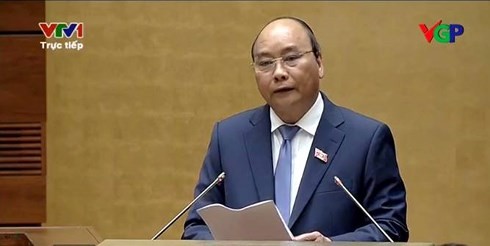(VOVWORLD) - National Assembly deputies will discuss on Tuesday the draft law on anti-corruption which will replace the 10-year old Law on Anti-Corruption. At last week’s National Assembly Q&A session, Prime Minister Nguyen Xuan Phuc reiterated the government’s determination to fight corruption more extensively.
 Prime Minister Nguyen Xuan Phuc Prime Minister Nguyen Xuan Phuc |
Vietnam has gained definite results in fight against corruption since the 2005 Law on Anti-Corruption came into force. Vietnam is a member of the UN Convention on Anti-Corruption and other international forums.
Since the 12th National Party Congress early last year, a number of officials have been punished showing that there’s no safe zone in the fight against corruption, which is also clearly stipulated in Party resolutions.
At the National Assembly Q&A session last Saturday, Prime Minister Nguyen Xuan Phuc said: “The fight against corruption is no-holds-barred. So, it’s important to mobilize coordination between the legal and judicial systems and all sectors to deal strictly with corruption cases. We also need to publicly report the results to the National Assembly, especially completed cases.”
Corruption remains despite these efforts. One reason is enforcement. Stipulations on inspections and audit activities to uncover corruption remain inadequate and ineffective.
A more comprehensive anti-corruption mechanism is needed
The draft law on Anti-Corruption focuses on building a comprehensive corruption prevention mechanism which is open and transparent. It also aims to create an effective mechanism to promptly defeat and deal with corruption.
Government Inspector Chief Le Minh Khai said: “The draft law provides new tools and expanded the subjects and focuses on preventing corruption. We wanted to design a law that makes corruption impossible. The draft law includes a strict, transparent work mechanism and rotating work positions.”
The draft law on anti-corruption includes revisions relevant to the Laws on State Budget, Investment, Public Investment, Enterprises, Criminal Code, and Civil Code. It also refers to the UN Convention on Anti-Corruption which focuses on comprehensive reform in of the fight against corruption.